See Free Press coverage of State Sen. Rahida Tlaib’s talk at protest at https://www.freep.com/story/money/cars/general-motors/2019/01/18/rashida-tlaib-protest-auto-show-gala/2620328002/
See MLive coverage of protest at https://www.mlive.com/naias/2019/01/gm-workers-protest-plant-closures-outside-detroit-auto-show-charity-gala.html
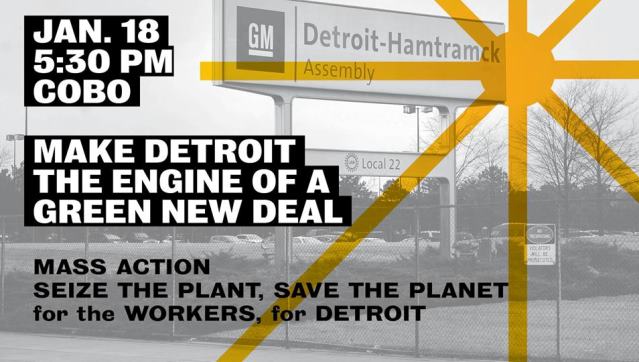
PROTEST THE AUTO SHOW PROM!
RALLY JAN 18th 5:30 pm Cobo Hall
Seize The Plant, Save the Planet: Make Detroit the engine for a Green New Deal!
Demand our local government—Mayor Duggan and Detroit City Council, and Mayor Majewski and Hamtramck City Council— take control of the Poletown plant and convert it to public use to create thousands of green union jobs.

Poletown before its demolition for GM profit
Thirty-seven years ago, the City of Detroit invoked eminent domain to gift the entire historic Poletown neighborhood in Hamtramck to GM, wiping out an entire community so the company could build the factory it intends to shutter.
Just 10 years ago, the people rescued GM from the brink of collapse with a $51 billion bailout.
Now, we are being “rewarded” with thousands of worker layoffs, yet another cruel slap in the faces of auto workers who have made vital contributions to the very survival and subsequent success of General Motors.
And while the company is ending production of the Volt and other smaller-sized sedans, it will be reinvesting in gas-guzzling pickup trucks and SUVs. In short, GM has abdicated even the most basic of commitments to the well-being of our society and the planet.
It is time that we as a community stand up to these reckless, corporate bullies and demand our elected leaders take the bold and decisive action we need in order to survive as a species.
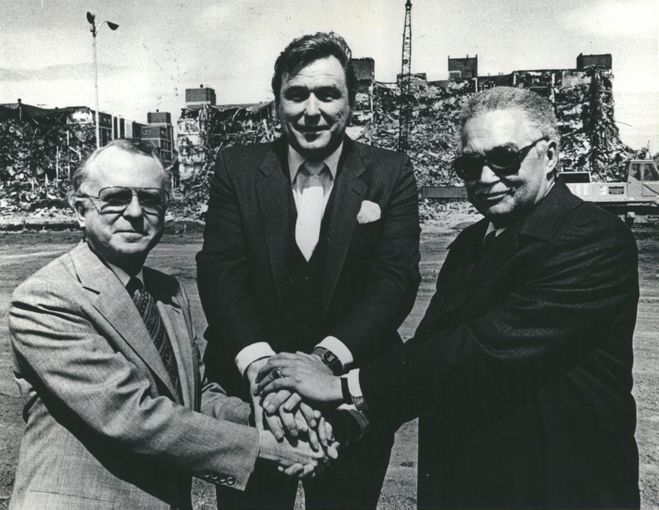
GM Chairman Roger Smith, (l), Hamtramck Mayor Robert Kozaren, and Detroit Mayor Coleman Young in front of wreckage of Dodge Main Plant. at groundbreaking for Detroit Hamtramck Assembly Plant. Workers from Dodge Main UAW Local 3 and AFSCME Local 457 fought for three years to Save Dodge Main, Save Detroit General Hospital. Since then, plants all over Detroit have been closed, and its public sector destroyed.
Join us to demand that our local governments –Mayor Mike Duggan and Detroit City Council, and Mayor Majewski and Hamtramck City Council respond to this outrage by immediately taking control of the Poletown plant and converting it to public use to create thousands of green union jobs.
We need bold action today if we are going to avert climate catastrophe and rehabilitate the Rust Belt. Let’s start that green revolution right here, by making Detroit the engine of a Green New Deal!!!
Signed on by:
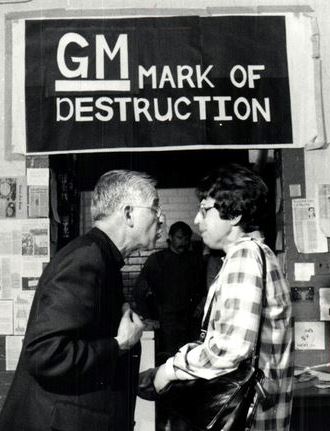
Poletown’s Immaculate Conception Pastor Joseph Karasiewicz and parishioner
Autoworkers Caravan/ Boggs Center/ Breathe Free Detroit/ Detroit Democratic Socialists of America (DSA)/ Detroit Eviction Defense/ Detroit Jews for Justice/ Detroit League of Revolutionaries for a New America East Ferry/Warren Community Assn./ East Michigan Environmental Action Council/OneHamtramck Soulardarity/Sunrise Lansing/ Unifor Local 222 Political Action Committee (Canada)/ Unifor Local 222 Retired Workers’ Chapter/ We the People, Michigan/ Detroit IWW/ GMB Solidarity Committee … so far
Email: gndcoalition@gmail.com
________________________________________________________
Moratorium NOW!: State MEGA tax credits oblige GM to maintain 34,750 jobs at Detroit Hamtramck Assembly and Warren Transmission plants
GM must repay 50% of tax credits if it relocates plant after they take effect
GM the only automaker to refuse to provide amounts of MEGA credits
By the Moratorium NOW! Coalition Contact: 313-319-0870
Facebook page at https://www.facebook.com/MoratoriumNowCoalition/
January 11, 2019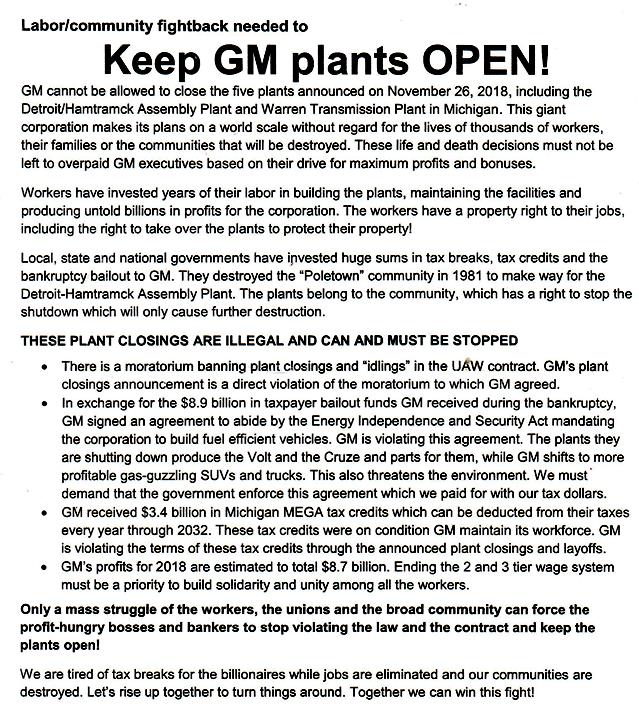
MORATORIUM NOW!/MICHIGAN EMERGENCY COMMITTEE AGAINST WAR AND INJUSTICE meet every Mon. 7 p.m. at 5920 Second Ave. in Detroit.
See full lawsuit at http://voiceofdetroit.net/wp-content/uploads/Complaint-v-MEDC-re-FOIA-GM-plant-closings-compressed-4.pdf
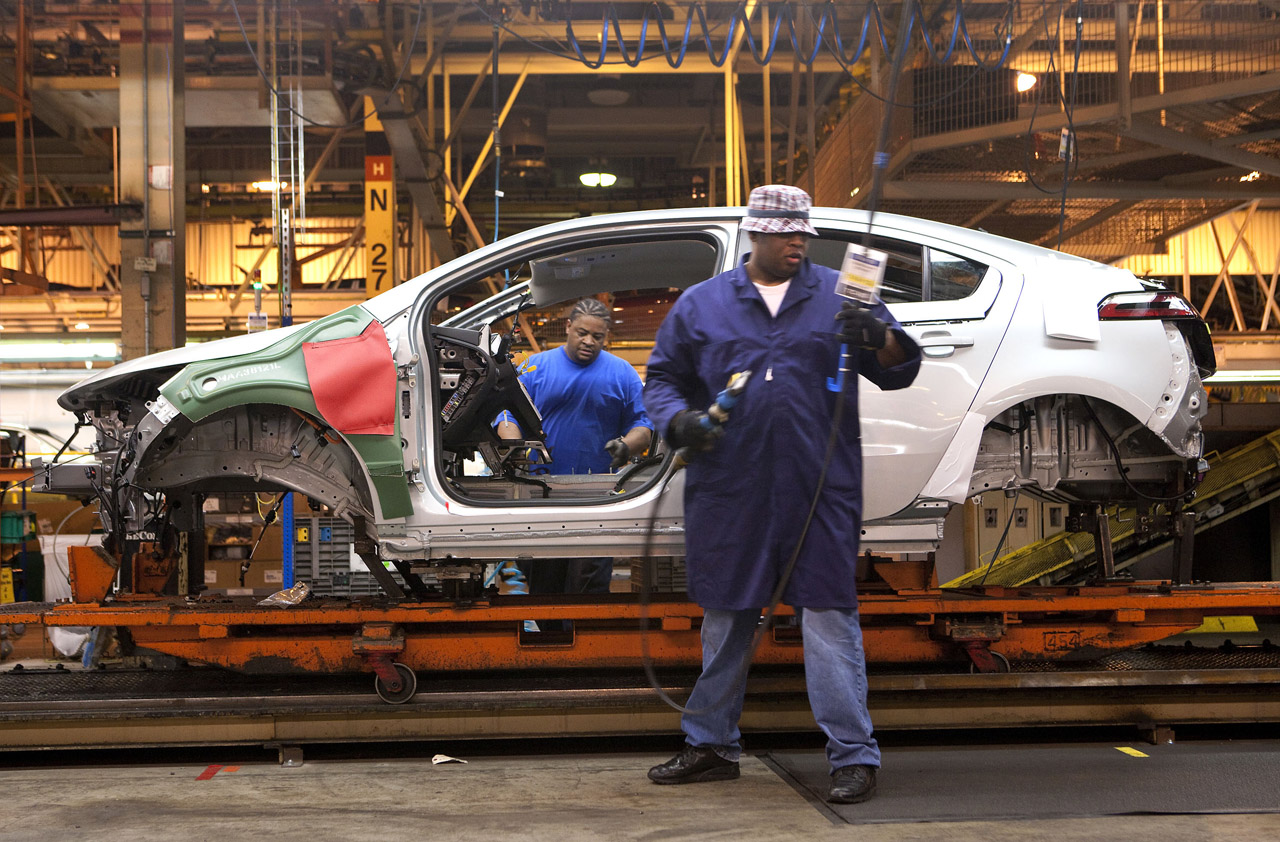
The Chevrolet Volt electric vehicle with extended range capability is assembled at the General Motors Detroit-Hamtramck Assembly Plant on the same line with Cadillac DTS and Buick Lucerne vehicles Tuesday, November 30, 2010 in Detroit, Michigan. (Photo by Jeffrey Sauger for Chevrolet
Above: GM Hamtramck Assembly worker Dnitra Landon reacts angrily to announcement that plant will close.
‘A KICK IN THE STOMACH’: MASSIVE GM LAYOFFS LEAVE WORKERS DISTRAUGHT – AND ANGRY
 Steven Greenhouse in Lordstown, Ohio
Steven Greenhouse in Lordstown, Ohio
12/31/2018
There’s a sign outside the General Motors assembly plant in Lordstown, Ohio, that reads: “GM, We Invested in You. Now It’s Your Turn to Invest in US.”
Ever since the US’s largest car company’s immense assembly plant opened here 52 years ago, it has dominated this blue-collar town. Now GM workers here are furious that the automaker plans to idle – and perhaps permanently close – the plant.
Related: ‘No jobs on the horizon’: workers respond to General Motors’ decision to close plant
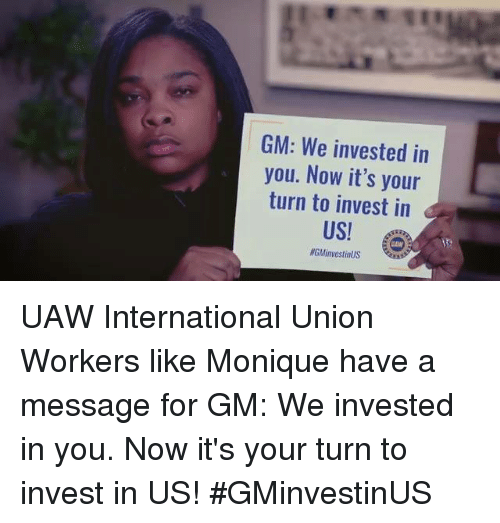
GM stunned its workforce on 26 November, the Monday after Thanksgiving, by announcing it would cut roughly 14,000 jobs and idle five factories in North America, including the Lordstown plant, which employs 1,600 workers. One factor stoking the workers’ ire is that GM’s move came after American taxpayers rescued it from bankruptcy with a $49.5bn federal bailout in 2009.
While some have blamed Trump policies for the closure, or at least for his inability to stop them, it’s the company that workers hold most responsible.
“Their announcement was really a kick in the stomach,” said Danny Adams, who has worked at the plant since 1996. “It’s not woe is me. It’s woe is us.”
Like many GM workers here, Adams, 53, is worried and bitter, not knowing where he might find a new job and wondering whether he’s too old to train for a new career. Adams could perhaps transfer to another GM plant, but he fears that such a move would be hugely trying for his 15-year-old son.
“This is devastating. This is our livelihood,” said Stephanie Allein, 40, who began working for GM in 2000 and was transferred to Lordstown in 2010.

Reactions at a union meeting in Oshawa, Ontario, one of the regions also affected by the layoffs. Photograph: Lars Hagberg/AFP/Getty Images
“This isn’t my first rodeo,” Allein said. “This is my third GM plant. I’d like to be able to plant my roots somewhere. I feel like a gypsy.” Allein, who helps assemble dashboards, transferred to Lordstown when her GM plant in Shreveport, Louisiana, closed. Before Shreveport, she worked at a GM-owned Delphi auto parts plant in Lockport, New York, which laid her off in 2006.
“When I came here,” Allein said, “there was this feeling this plant has been around forever, that this plant wasn’t going anywhere. You felt a security coming here. People bought houses.” The Lordstown facility occupies over 900 acres and has produced more than 16m vehicles, including Pontiac Firebirds and Chevy Cavaliers and Vegas. Last year, it generated $250m in wages, money that was the engine of Lordstown’s economy.
GM’s decision left people fuming, but not without hope, because it didn’t say the plant was closing. Rather, it said the plant was “unallocated”. That day, GM announced it was ending production of the Chevy Cruze in the US – that’s the car the Lordstown plant makes (although GM will continue to produce the Cruze in Mexico along with several crossover vehicles). GM was responding to a slowdown in sales of smaller cars, like the Cruze, and to Trump’s easing fuel economy standards, a move making it easier for automakers to focus on producing larger cars and trucks.
GM said it was idling Lordstown and four other plants – in Detroit; Baltimore; Warren, Michigan; and Oshawa, Ontario – to cut costs and free up money to invest in electric and autonomous cars. The Lordstown workers hope GM will opt to assemble another car, perhaps an electric car, here. “We should be building the next-generation car here,” Allein said. “We should be building the crossovers here, not in Mexico.”

GM CEO Mary Barra announces plant closings.
The workers are also angry that GM, helped by the $1 trillion corporate tax cut enacted last year, has spent nearly $14 billion on stock buybacks since 2015, money that could have been invested in developing next-generation vehicles.
There’s a bipartisan push to save the plant. Governor John Kasich, a Republican, Senator Sherrod Brown, a Democrat, and Senator Rob Portman, a Republican, have pressed GM’s chief executive, Mary Barra, to find a way to keep the plant open. Brown, who is contemplating a presidential run in 2020, has urged Trump to back legislation he has introduced that would give consumers $3,500 rebates on American-made cars.
United Auto Workers Local 1112 here has mounted a letter-writing campaign – including hundreds of letters from children – to urge Barra not to shutter the plant. Jake Shevetz, a second grader, wrote: “I don’t want to move and the families that have to move probably don’t want to. But my mom says if they get something new, we won’t have to move.”
Cheryl Jonesco, who was laid off in early 2017 when the Lordstown plant cut its third shift, said: “They’re receiving our taxpayer dollars and investing in these other countries. I don’t know how Barra can lay in her bed and sleep at night.”
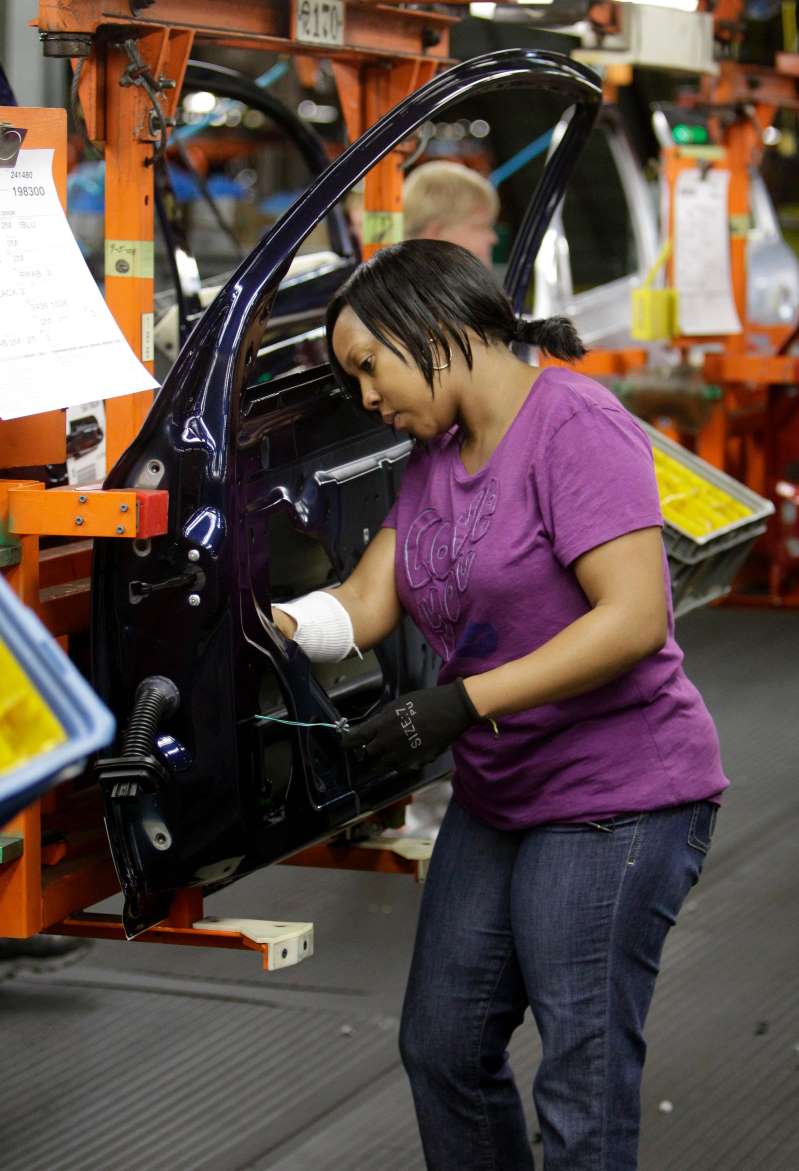
Worker at GM’s Lordstown Assembly Plant.
Dave Green, president of UAW Local 1112, said his goal wasn’t just to persuade GM to keep the plant open, but to make sure the workers have alternatives. His local has created a transition center that workers stream into day after day, to ask for help finding another job or getting retraining.
“GM is betraying the American worker, the American taxpayer,” Green said. “Chevrolet is apple pie. It’s an American icon. What disturbs me is GM is going to exit this entry-level segment. If there’s no entry-level cars, what are they going to put people in? Are we going to see Toyota, Honda and Kia gain market share and GM throwing in the towel?”
Last April, Ford announced it was eliminating traditional sedans from its US lineup, except for the Mustang, ending production of the Focus, Fusion, Fiesta and Taurus. That came after Fiat Chrysler cut the Dodge Dart and Chrysler 200 to concentrate on more profitable Ram pickups and Jeep SUVs.
Adams says GM is making a strategic mistake by ending US production of the Cruze and several other sedans: the Chevy Impala, Chevy Volt and Buick LaCrosse. “GM had the perfect opportunity to say, ‘We are the only American car manufacturing company that is building cars in the USA.’ They could have been like Harley-Davidson. They missed it right there because they want their pockets full of money.”
In a speech in nearby Youngstown in July 2017, Trump promised to bring back auto jobs. “They’re all coming back,” he said. “Don’t move, don’t sell your house.” Trump has criticized GM about layoffs, but the Lordstown workers say he hasn’t done enough.
“If you’re going to make promises, you got to keep your promises,” Adams said. “I’m sorry. We’re blue-collar. You shake my hand. It’s a promise.”
Ever since the US’s largest car company’s immense assembly plant opened here 52 years ago, it has dominated this blue-collar town. Now GM workers here are furious that the automaker plans to idle – and perhaps permanently close – the plant.
Related: ‘No jobs on the horizon’: workers respond to General Motors’ decision to close plant
Trump threatens to cut GM subsidies in retaliation for U.S. job cuts
The workers are also angry that GM, helped by the $1 trillion corporate tax enacted last year, has spent nearly $14 billion on stock buybacks since 2015, money that could have been invested in developing next-generation vehicles.
There’s a bipartisan push to save the plant. Governor John Kasich, a Republican, Senator Sherrod Brown, a Democrat, and Senator Rob Portman, a Republican, have pressed GM’s chief executive, Mary Barra, to find a way to keep the plant open. Brown, who is contemplating a presidential run in 2020, has urged Trump to back legislation he has introduced that would give consumers $3,500 rebates on American-made cars.
United Auto Workers Local 1112 here has mounted a letter-writing campaign – including hundreds of letters from children – to urge Barra not to shutter the plant. Jake Shevetz, a second grader, wrote: “I don’t want to move and the families that have to move probably don’t want to. But my mom says if they get something new, we won’t have to move.”
Cheryl Jonesco, who was laid off in early 2017 when the Lordstown plant cut its third shift, said: “They’re receiving our taxpayer dollars and investing in these other countries. I don’t know how Barra can lay in her bed and sleep at night.”
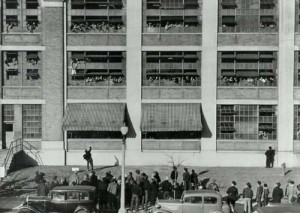
The alternative: Sitdown at GM plant in 1930’s.
Dave Green, president of UAW Local 1112, said his goal wasn’t just to persuade GM to keep the plant open, but to make sure the workers have alternatives. His local has created a transition center that workers stream into day after day, to ask for help finding another job or getting retraining.
“GM is betraying the American worker, the American taxpayer,” Green said. “Chevrolet is apple pie. It’s an American icon. What disturbs me is GM is going to exit this entry-level segment. If there’s no entry-level cars, what are they going to put people in? Are we going to see Toyota, Honda and Kia gain market share and GM throwing in the towel?”
Many workers suspect that GM announced that it was leaving Lordstown “unallocated” rather than closing it outright in order to pressure the UAW to grant some concessions in next year’s contract negotiations to help persuade GM to keep the plant open.
If that’s GM’s tactic, Adams isn’t buying it. “That’s 100% union-busting,” he said. “They’re just trying to make us beg.”
While the workers feel anger, they also feel a lot of pride. They’re proud that the Cruze and the high marks it received helped restore GM’s reputation after the 2009 bankruptcy. “When we heard the news in November, we went right back to our jobs,” Allein said. “We give 100%. We didn’t give up. I don’t think anybody is ready to give up. No one wants to believe that this is it for Lordstown.”
Steven Greenhouse is the author of the book, Beaten Down, Worked Up: The Past, Present, and Future of America Labor, which will be published in August 2019




